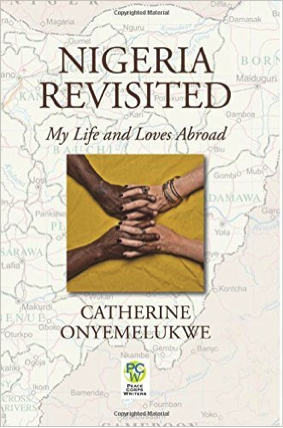Catherine Onyemelukwe,
Nigeria Revisited: My Life and Loves Abroad
reviewed by Alison McBain

Nigeria Revisited: My Life and Loves Abroad Publisher: Peace Corps Writers Date: October 31, 2014 Trade Paperback: 312 pages ISBN: 1935925474; 9781935925477 Price: $14.62 |
Catherine Onyemelukwe is a writer who lives in the next town over from me, and I first met her a couple of years ago at my local library. Although I didn’t chat with her very much then, I was intrigued by what she told me about her memoir. I didn’t pick up her book until pretty recently, however, and I was glad to have the opportunity to read it. Her story is very interesting: a mixture of adventure and historical events, love and danger, humor and tragedy.
Her journey to Nigeria began as a member of one of the first groups of Peace Corps volunteers to be sent abroad, a year after the Corps was established in 1961. She was sent to teach German to children in a country she knew very little about. She planned to be away for two years, and ended up living in Nigeria for twenty-four years instead.
She was in Nigeria when President Kennedy was shot, and it was where she met her husband and had her children. She was there for the Biafran War, also known as the Nigerian Civil War. Her husband was Ibo and supported Biafran independence, and she experienced the terrors of bombings and evacuations, threats of scarcity and danger.
During this time, she also returned several times to the United States. Once, she left during the civil war; and once, to pursue higher education to help with her employment.
When it comes to memoirs, I like to learn something new, not just about the writer, but also about the wider world. I enjoyed the level of detail Ms. Onyemelukwe included in parts of the novel, especially — and this is probably because my husband is a chef and I’ve learned to pay attention to these things — the different descriptions of food throughout the book. I feel that food is the one part of culture that can be distinctive at the same time as it is universal; no matter where you are, eating can be an action of family and community. And so I enjoyed experiencing a new cuisine, albeit vicariously.
Ms. Onyemelukwe’s writing is very straightforward and often almost sparse. I walked away from the book with a thorough knowledge of Nigeria and the customs of its people, but a somewhat less complete picture of the writer. Ms. Onyemelukwe lived through some interesting times, but sometimes there aren’t as many details as I would have liked.
I felt there was a fair amount of personal information related in a clinical way. The best passages of the book reflect her identity, with dialogue and humor and insight into the events taking place around her and inside her own life. But some parts of her life are told as if they happened to someone else.
I understand that a lot of time might have passed between the events themselves and the writing of the book, but this feels like it was done deliberately rather than due to a memory lapse. One example that comes to mind is the relation of her many affairs in her marriage. I felt I finished the book without knowing her personal reaction to the affairs. Did she love the men? How did it ultimately affect her family? All questions I wondered as I read, but remained unanswered by the end of the narrative.
Overall, though, I really enjoyed the memoir and would recommend it as a unique narrative for those interested in the Peace Corps or the events of Nigeria’s tumultuous history. Ms. Onyemelukwe lived in a pivotal time, and her marriage to a Nigerian sparked outrage and hate in America at a time when race relations were changing for the better but were still terribly tense. She persevered despite facing hatred and threats, and she raised a family and made a difference in her chosen home. I feel the overwhelming impression I had from the book was that her persistence overcame the obstacles thrown in her path.
I enjoyed reading the book, and I hope you will too.
Copyright © 2016 by Alison McBain

